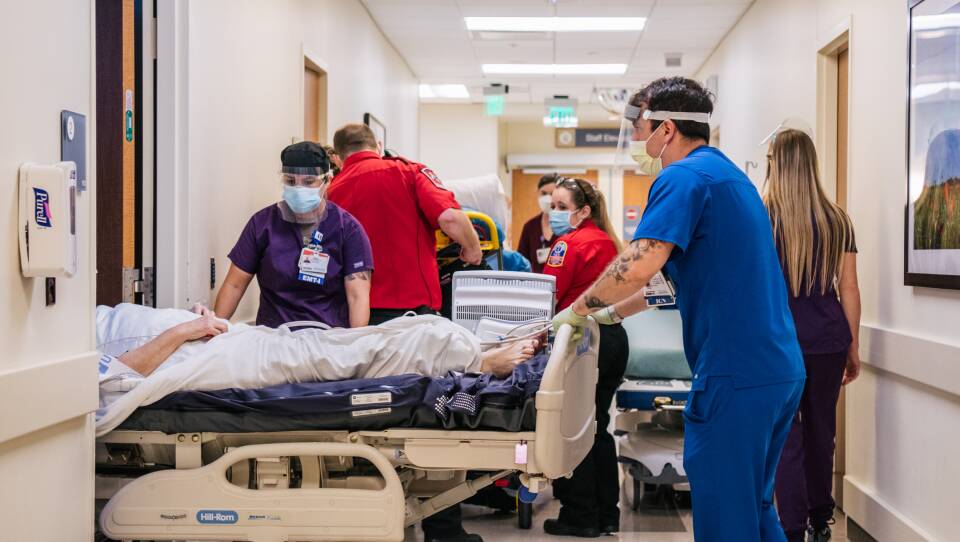Massachusetts hospitals paid a staggering $1.52 billion last year to hire temporary hospital workers, mostly “travel nurses,” amid a labor shortage that contributed to record financial losses for many institutions.
The exponential growth of labor costs is included in a new report issued by the Massachusetts Health and Hospital Association on Monday. The report shows in fiscal year 2019, prior to the pandemic, hospitals spent $204 million on temporary staff. That number skyrocketed in FY2022 to $1.52 billion — a 610% increase.
“It is staggering,” said Daniel McHale, vice president of healthcare finance at MHA. “And ... it’s not unique to Massachusetts.”
McHale, who helped prepare the report, cited a Massachusetts Center for Health Information and Analysis report that found four in five hospitals lost money during the last fiscal year.
“The net result is financial losses for hospitals,” he said. “So, we’ve had the worst kind of financial performance in many years, even during the pandemic years.”
Another MHA report, issued in October, estimated that there are 19,000 vacancies at hospitals across the state. Nurses have gone on strike across the country to protest low staff-to-patient ratios and poor working conditions, from the monthslong strike at St. Vincent’s Hospital in Worcester to New York City, where 7,000 nurses walked off the job in January.
Throughout the pandemic, many hospitals hired registered nurses and other hospital staff through “traveler” agencies to fill gaps — temporary gigs that often paid much higher hourly salaries than what staff nurses and clinicians earned. It’s a dynamic that can create resentment among staff nurses, on top of the burden to hospital budgets, as GBH News previously reported.
At UMass Memorial Health in Worcester, CFO, vice president and treasurer Sergio Melgar said his health care system went into FY 2022 with 600 open jobs, and filling those vacancies with temporary workers was expensive. In some cases, he said, traveling workers were paid triple times the cost of pre-COVID rates.
Though the added expense was a significant financial stress, he said that, with an increase in patient volume and lack of staff, their health care system had no choice.
“It can cost us up to $20 million a month to get these personnel to come in because we have the patients, and we are the provider for central Massachusetts,” he said. “So, we actively made that decision that we are going to do it in the short term, see how it evolves.”
Melgar said costs have since come down, but in fiscal year 2022, UMass Memorial spent more than $150 million in temporary labor costs.
"Everyone is struggling. Everyone is feeling the financial impact and the morale impact of the contract labor necessities."Justine Zilliken at Sturdy Memorial Hospital in Attleboro
At Sturdy Memorial Hospital in Attleboro, Chief Strategy Officer Justine Zilliken said the workforce shortage coupled with the bruising reality of the COVID-19 pandemic forced her hospital to lean on temporary labor.
“Contract labor isn’t only nursing,” she said. “We’re seeing incredible shortages in therapists and other ancillary service members, as well.”
Zilliken said, in fiscal year 2022, Sturdy Memorial had contract labor expenses climb from less than $2 million annually pre-pandemic to $14 million.
“As you can imagine, that’s a staggering impact on any care system, let alone your independent community serving health system,” she said.
Many hospitals offered extensive signing bonuses and retention packages to keep employees. A recent survey from the Massachusetts Medical Society found that one in four Massachusetts doctors plan to leave medicine in the next two years, causing more concerns about the future stability of the state’s health care workforce.
“Everyone has really been pummeled by the workforce shortage, people opting out of health care careers and leaving their careers,” Zilliken said. “Everyone is struggling. Everyone is feeling the financial impact and the morale impact of the contract labor necessities.”
Zilliken and Melgar said increased labor costs are not an expense that gets passed on to patients, but rather it's paid by the hospital system that delivers the care it’s committed to giving.
So far, hospitals have had to absorb the financial losses. It’s a policy area that the MHA report highlights as needing change to overcome exponential health care costs.
Steve Walsh, MHA’s president and CEO, said Massachusetts’ cost-growth benchmark — set up in the state to cap health care costs — is no longer an adequate way to assess the current health system. Walsh said the traveler agencies and temporary worker trend demands a policy re-focus.
“The cost pressures thrust upon hospitals and health systems within the past several years — particularly around temporary staffing — have simply become too pervasive to ignore.”








